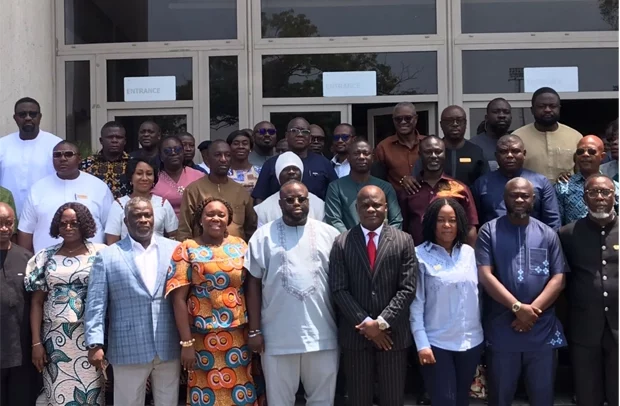The minister in a group photograph with MPs and MMDCEs at the press briefing in Accra
The Minister for Local Government, Chieftaincy and Religious Affairs, Ahmed Ibrahim, has called all Metropolitan, Municipal and District Assemblies (MMDCEs) to commit to government’s flagship initiative of the “Clean Up Ghana Agenda” to help keep the country clean.
Speaking at a press briefing ahead of the National Sanitation Day launch on Saturday, the minister stated that Ghana, like many rapidly urbanising countries, continues to face major challenges in sanitation and waste management.
“From indiscriminate dumping of refuse to choked drains that contribute to perennial flooding, to the unsightly heaps of waste in our markets, lorry terminals, city corners and streets, these challenges threaten not only our public health but also our economic growth and the very image of our nation,” he said.
The minister added that the re-introduction of the Sanitation Day is therefore a renewed social contract between government and citizens, anchored on accountability, enforcement, and sustainability, hence the need for assemblies to commit to the initiative.
Mr. Ibrahim further stated that the clear objective of the sanitation relaunch includes to restore discipline and pride in public spaces because a clean environment is a necessity for public health and national dignity; empower and mobilise local government structures; and additionally foster citizen participation and accountability, as the success of this laudable initiative rests on the active involvement of all stakeholders, households, communities, civil society, the private sector, and the media.
Mr. Ibrahim further directed all Metropolitan, Municipal and District Assemblies to ensure that “all public spaces, ceremonial streets, and visible nuisances within your jurisdiction must be cleared by 8:00 a.m. every day, beginning tomorrow (today), September 4, 2025.”
He added that the first six months will serve as a performance benchmark during which assemblies are required to progressively shorten the timeframe for removal of the nuisances stated. By the end of this period, assemblies must sustainably demonstrate that unsightly scenes of filth have been eliminated.
He also charged all assemblies to prioritise the desilting of drains, the removal of waste heaps, and the regular cleansing of ceremonial routes, markets, lorry stations, schools, and public spaces.
The minister also informed the assemblies to mobilise and deploy their environmental health officers, waste management officers, private waste service providers, community volunteers and the citizens to sustain the compliance of this directive, saying, “with the laid down directives, we can’t fail in making Ghana clean.”
Ga West Metropolitan Chief Executive (MCE) and Dean of MMDCEs, John Desmond Nii Sowah Nai, pledged to commit to enforcing these new standards of cleanliness to transform the sanitation landscape of Ghana.
By Prince Fiifi Yorke


